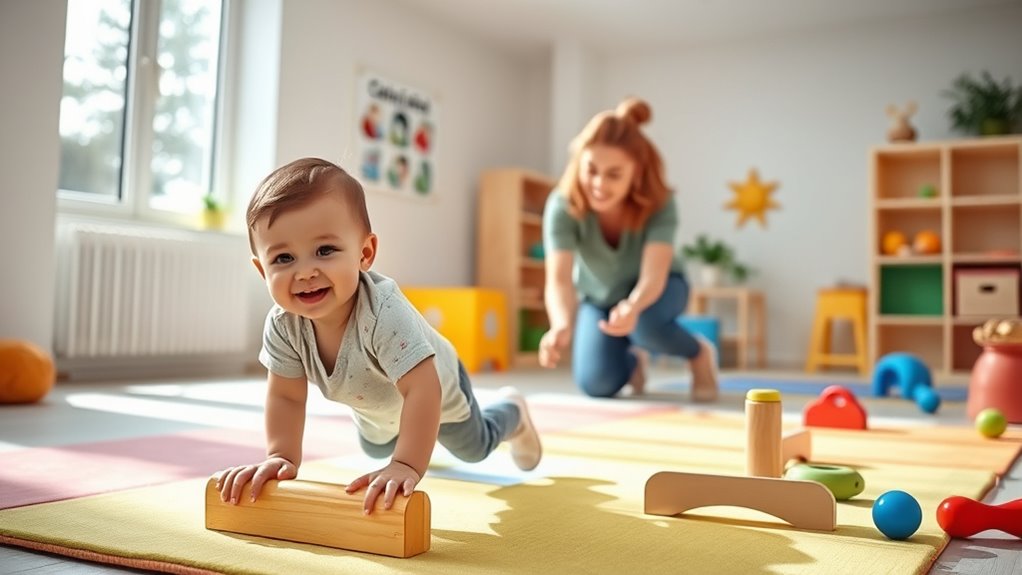To boost your toddler’s motor skills, focus on sensory play with textured bins, or activities like stringing beads and stacking blocks to improve fine motor control. Incorporate routine tasks like tearing paper or turning knobs to build strength and coordination naturally. Use colorful, textured materials to engage their interest and make skill development fun. Keep practicing these activities regularly, and you’ll discover effective ways to support their growth—stay with us to learn more.
Key Takeaways
- Engage toddlers in sensory play with textured materials like rice or beans to enhance tactile discrimination and finger strength.
- Incorporate fine motor activities such as bead stringing and block stacking to improve hand-eye coordination and dexterity.
- Use routine tasks like tearing paper or turning knobs as functional opportunities to develop grip and hand control.
- Make play enjoyable with tools and varied textures, promoting natural, consistent practice of precise hand movements.
- Select age-appropriate, colorful materials and challenge hand-eye coordination to support overall motor skill development.

Developing strong motor skills is essential for your toddler’s overall growth, and engaging in targeted activities can make a significant difference. As a parent or caregiver, you can support this development through simple, enjoyable activities that focus on enhancing your child’s fine motor skills. One effective approach involves sensory play, which stimulates your child’s senses while promoting precise hand movements. Sensory bins filled with rice, beans, or pasta allow your toddler to explore textures, practice grasping, and refine their pincer grip—all of which are fundamental for fine motor development. Incorporate small tools like scoops, tongs, or spoons during sensory play to encourage your child to pick up, transfer, and manipulate objects, further strengthening their finger and hand muscles.
Alongside sensory play, engaging your toddler in specific fine motor activities can accelerate their skill-building. Activities like stringing beads, stacking blocks, or fitting shapes into matching holes are simple yet powerful ways to improve hand-eye coordination and finger dexterity. These tasks challenge your child to use precise movements and develop their pincer grasp, which is vital for later skills like writing and buttoning. To make these activities more engaging, choose colorful, age-appropriate materials that capture your toddler’s interest. Providing different textures and sizes not only keeps the activities fun but also enhances their tactile discrimination, an important aspect of sensory development.
You can also incorporate everyday routines into fine motor development. Encourage your toddler to help with simple chores such as tearing paper into pieces, squeezing a sponge during cleaning, or turning knobs and handles. These actions naturally promote hand strength and coordination, turning routine tasks into valuable skill-building opportunities. As your child practices these motions, they become more confident and capable in handling objects with control and precision.

Creativity for Kids Sensory Bin: Construction Zone Playset – Preschool Learning Activities, Excavator Toys for Boys Ages 3-5+, Outdoor Toys and Gifts for Kids
DIG INTO CONSTRUCTION FUN: Build your own mini construction site with this interactive sensory bin, perfect for kids…
As an affiliate, we earn on qualifying purchases.
As an affiliate, we earn on qualifying purchases.
Frequently Asked Questions
When Should I Seek Professional Help for My Toddler’S Motor Delays?
If you’re concerned about your toddler’s motor development, it’s best to seek professional help early, especially if they’re not meeting developmental milestones like crawling, walking, or grasping objects by expected ages. Early intervention can make a significant difference, so don’t wait if you notice delays. A pediatrician or occupational therapist can assess your child and recommend targeted activities to support their motor skills and overall growth.
Are There Activities Suitable for Toddlers With Physical Disabilities?
Imagine a world where every child shines—yes, even your little one with physical disabilities. You can engage them with adaptive activities and inclusive play, designed to meet their unique needs. These activities promote motor skills, boost confidence, and foster joy. By tailoring activities to their abilities, you create a supportive environment that encourages growth and inclusion, making every moment together a step toward their fullest potential.
How Can I Incorporate Motor Skill Development Into Daily Routines?
You can easily incorporate motor skill development into daily routines by engaging your toddler in playground activities, like climbing and jumping, to build strength and coordination. During mealtime routines, encourage your child to help with pouring or stirring, fostering fine motor skills. These activities make learning fun and naturally fit into your day, helping your toddler develop essential motor skills without extra effort.
What Safety Precautions Should I Take During Motor Activities?
Think of your home as a castle, where safety is your shield. To protect your little explorer, childproofing hazards like sharp edges and choking risks is essential. Always supervise activities, like a watchful guardian, ensuring your child stays safe while developing their motor skills. Keep hazardous objects out of reach, and stay attentive, so every adventure becomes a safe journey of growth and discovery.
How Do I Motivate My Toddler to Participate in Motor Activities?
To motivate your toddler to participate in motor activities, focus on encouraging participation by making activities fun. Use playful language, sing songs, or turn exercises into games to capture their interest. Offer praise and small rewards to boost confidence. Keep sessions short and varied, so your toddler stays engaged. Remember, your enthusiasm and creativity inspire them to enjoy movement and develop their skills naturally.

Melissa & Doug Primary Lacing Beads – 30 Wooden Beads for Crafts & 2 Laces in Toy Storage Box, Small Beads for Kids Arts and Crafts Kits, Preschool Learning Toys for Girls & Boys Ages 3+
Brightly Colored Wooden Craft Beads: The Melissa & Doug Primary Lacing Beads set includes 30 colorful wooden beads…
As an affiliate, we earn on qualifying purchases.
As an affiliate, we earn on qualifying purchases.
Conclusion
Remember, consistency is key when working on your toddler’s motor skills. It might seem challenging at first, but incorporating these activities into daily routines makes progress enjoyable and natural. Don’t worry if you don’t see immediate results; patience and persistence pay off over time. Keep encouraging your little one, and celebrate small wins. With your support and these fun activities, you’ll help them develop strong, confident motor skills that will serve them well for years to come.

Montessori Wooden Beads Sequencing Toy Set, Stacking Blocks & Lacing Beads & Matching Shape Stacker for 2 3 4 5 Year Old STEM Preschool Learning Montessori Toys Gifts for Kids Boy Girl Toddler
【Multifunctional Montessori Toys】Our wooden toys comes with 25 X colorful wooden beads with various shapes, 1 X wooden…
As an affiliate, we earn on qualifying purchases.
As an affiliate, we earn on qualifying purchases.

YUNCHY Toddler Fine Motor Skill Toy, Bee to Hive Matching Game, Montessori Wooden Color Sorting Matching Toy, Preschool Educational Learning Toys Gift for Toddler 3 Years Old
Preschool Learning Toy: This wooden bee to hive matching toy includes a bee hive, 7 colorful bees, 1…
As an affiliate, we earn on qualifying purchases.
As an affiliate, we earn on qualifying purchases.









